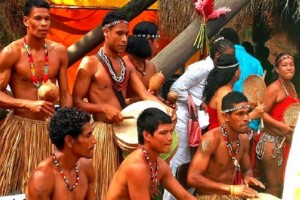
BELIZE CITY, Belize – The Caribbean’s indigenous people have called to be given a seat at the political table so as to safeguard their rights to their ancestral lands and resources.
The call for political representation for the minority first peoples of the region is one of a slew of recommendations on health, education, gender, sustainable livelihoods, land rights and access to justice, drafted after three days of deliberations by the leaders and representatives of indigenous peoples from six CARICOM nations at a historic University of the West Indies (UWI) conference of indigenous peoples.
Host country Belize is home to more than 50,000 Maya and Garifuna peoples, roughly one-tenth of the population.
The conference, organized by UWI IMPACT Justice, a Canadian-funded project to improve access to justice in the Caribbean, has been hailed as a rare, unique and historic gathering of the region’s indigenous peoples and a recognition of the need to redress centuries of degradation and discrimination.
“The Indigenous People should have a seat at the table,” Louis Patrick Hill, a representative of Dominica’s Kalinago chief, who is a former senator in the U.S. Virgin Islands legislature.
“They have very little representation at the levels of government because of the political party system that exists in most of the Caribbean and Latin American countries, and because the indigenous peoples are a minority in those countries we find that the political representation is almost not there.”
The conference proposed that New Zealand’s model of representation for its indigenous Māori people, which reserves seats for representatives of Māori in parliament. Each electoral district is covered by both a general and a Māori electorate.
“We highly recommend … a very extensive, formal, consultation with the peoples who are being affected and for whom solutions are being proposed,” said Laura George of Guyana’s Amerindian Peoples Association.
At the level of international law, there was a call for CARICOM governments to ratify Article 169 of the International Labour Organization (ILO), considered the most important international law guaranteeing the rights of indigenous peoples.
The 1989 convention depends on a high number of states ratifying it to give it greater power. So far, only a score of nations worldwide have adopted the convention.
Amounting for roughly 10% of the populations in Belize, Guyana, Suriname, Dominica, St. Vincent and the Grenadines, and Trinidad and Tobago, they have been beset by centuries of exclusion, denial, discrimination and disproportionately high poverty rates.
They include a host of Amerindian nations in Guyana and Suriname, the Kalinago of Dominica, and Carib communities in St. Vincent and the Grenadines. Southern Belize is home to around 50,000 Mayans and Garifuna, a mixed race group of Caribs and Africans who were driven from their Vincentian homelands in 1797 by the colonizing British and exiled in Belize.


